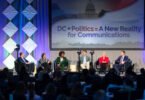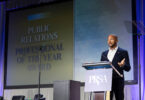Several unfortunate events of late have thrust the issue of ethics to the forefront of discussion and debate in the public relations industry:
- A high-tech public relations firm allegedly directed its interns to write favorable reviews of computer games sold by its clients.
- A D.C. lobbying firm is said to have sent letters to political constituents on a third-party’s letterhead, giving the impression that the letters originated with that organization.
- A public relations firm allegedly established a program through which clients could engage a stable of “tweeters” to propagate favorable messages about its clients and their products.
- In the current debate on health care reform, special interest groups are accused of setting up and/or funding organizations to promote their positions, without disclosing who is actually behind the groups.
- A major aerospace concern is investigating reports that one of its employees attended an industry gathering posing as a journalist and blogger and participated in press conferences staged by two of its competitors.
These events prompted PRSA to broadly condemn such acts as constituting no less than public relations “malpractice” under our Code of Ethics. The Twittersphere’s reaction to PRSA’s announcement was swift and positive, as evidenced by the overwhelming number of individuals who “re-tweeted” the link to our announcement. Clearly, these individuals are as dismayed as we are over the current state of ethical conduct in our field.
Yet, for a select few, our announcement did not go far enough. How could we expect such a proclamation to carry any weight or meaning without naming names, shaming the guilty and exacting a pound of flesh?
But as I’ve learned in business, as in life, there are three kinds of people: those who are willing to take a stand, those who are unable (or, more likely, unwilling) to take a stand, and those who are simply content to sit back and criticize whichever course of action you pursue.
It is unfortunate that these latter groups’ perception of what the PRSA Code of Ethics should do — and actually can do in an unregulated industry that enjoys broad First Amendment protections — are so out of sync. These are the same people who, on one hand, disparage PRSA’s efforts to be an ethical standard bearer for the industry, while on the other hand crying out that our efforts do not go far enough.
Yet, when an ethical breach hits the rhetorical fan, where do these same folks turn a measure of air cover? You guessed it.
The industry cannot have it both ways, let alone all three ways.
Our critics probably have no idea that the PRSA Board of Ethics and Professional Standards (BEPS) did attempt to levy sanctions for breaches of the PRSA Code of Ethics for a period of about 50 years, ending in the late 1990s. During that time, formal sanctions were brought in only four of 232 cases that BEPS investigated. All of the case information was treated a confidential — never to be viewed by anyone, even the accused — for legal and practical reasons.
Over the past few years, PRSA has reexamined the possibility of bringing back enforcement our Code of Ethics. But unless the industry is willing to pursue professional licensing — or fund a PRSA legal defense fund for those individuals and agencies who feel wrongly accused and are inclined to sue — there is simply no way that such concept will work.
(Ironically, the Society of Professional Journalists [SPJ] lost a lawsuit several years ago when they named names in a teaching document called “Doing Ethics in Journalism.” The organization settled the lawsuit for a large sum.)
In establishing our Code of Ethics, PRSA’s principal goal was first and foremost to ensure that our members (let me repeat: our members) practice ethical public relations. If we can encourage others in the profession to follow our lead, so much the better. But is it PRSA’s job to investigate an agency, determine whether or not a PRSA member was involved and then hang that person in the public relations square for all to see? Is that an effective use of our members’ membership dollars, or is it tilting at windmills?
We do hear, anecdotally, that some public relations agencies are requiring their employees to sign a pledge to abide by our Code of Ethics, regardless of whether their employees are actually PRSA members. And today, we have more dialogue and action regarding ethics than ever before. For example, we now have 10 Practice Standards Advisories, or updates to our Code of Ethics, whereas none existed before.
News organizations can run the risk of naming names; toward that end, they have their job to do, and we have ours. The fact is, PRSA does not have the power, and probably never will, to sanction everybody in the industry who hangs out a shingle and proclaims his or herself to be a professional public relations practitioner. All we can do is establish and teach standards, and set a good example through our words and our actions.
I’ll take our current approach any day.
Michael G. Cherenson, APR, is 2009 Chair and CEO of PRSA.







I wrote the critical post Mr. Cherenson refers to. And I got the very same pedantic response posted as a comment to my blog, except signed by PRSA’s PR director Arthur Yann. Here’s how I answer both of them:
…………
Michael, Arthur, et al:
I’m not one of a “select few.” I’m among the majority of working public relations, marketing, lobbying, investor relations and other strategic communications professionals who think PRSA’s code of ethics is irrelevant – if they even know or care that it exists.
You say PRSA has neither the inclination nor resources to champion its own code of ethics. Yet it pontificates in the language of authoritative advocate, proclaiming with all gravity that PRSA has determined there’s “a common thread of malpractice under the Public Relations Society of America’s (PRSA) Code of Ethics and PRSA Professional Standards Advisories (PSA).”
You want people to believe that PRSA is in a position to do something about this “malpractice.” But as you said, that’s just posturing for the sake of awareness and education.
It doesn’t matter what the association used to do, or what it is thinking about doing. What matters is whether or not PRSA is solving right now what it preaches to be a growing threat to the integrity of the entire profession, members or not.
I argue that PRSA isn’t.
And if PRSA thinks the only way it can give teeth to its code of ethics is through licensing or by having enough money to defend against lawsuits, then you all really don’t understand how public relations works.
Maybe that’s the real problem.
Steven Silvers, APR
PRSA member for 23 years
Steve:
I believe the PRSA Code of Ethics is but one beacon in the harbor, there to help public relations professionals navigate the professional waters. Certainly, others are free to ignore the light we cast.
As you know, we are a community of volunteer leaders who dedicate our time and effort to improving this profession. I feel confident in saying that hundreds of thousands of professionals, academics, researchers, students and scores of institutions – including the US Department of Defense — not only know the Code exists, but actively study, follow and support it.
Some may wish to grab their pitchforks and lanterns, or paint scarlet letters, but I’ll stick with the lighthouse and do all that I can to help fellow professionals pilot their careers and create an environment where public relations can continue to thrive.
Thanks for your interest in the topic and PRSA.
~ Mike Cherenson
PRSA Chair and CEO